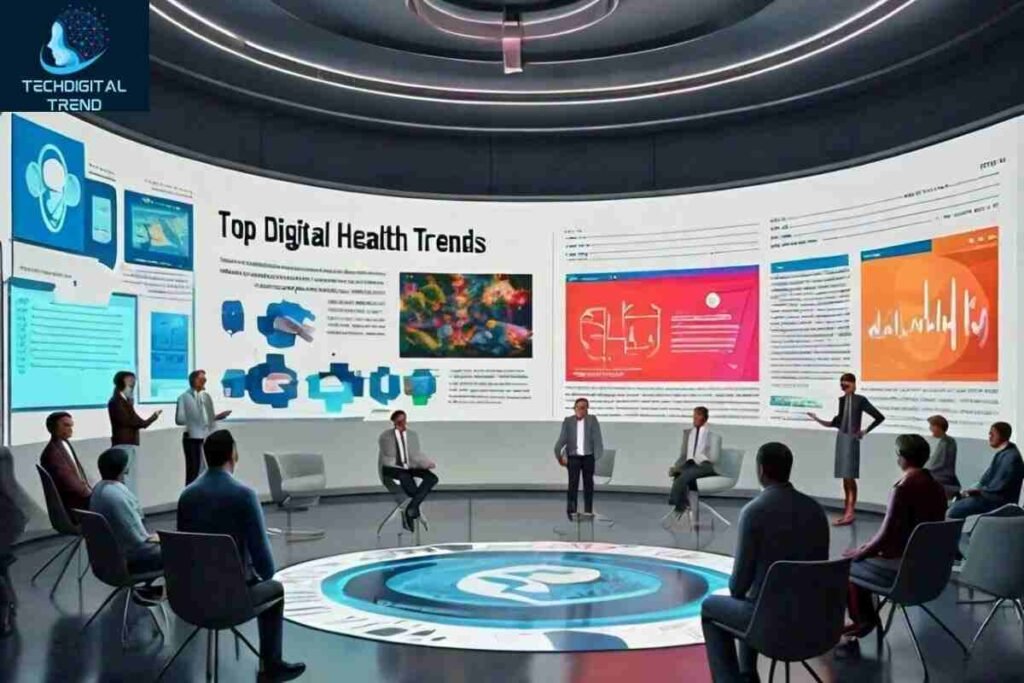Table of Contents
ToggleDigital Health
Discover the latest digital health trends in 2024, including telemedicine, AI-powered diagnostics, and personalized medicine. Learn how technology is transforming the healthcare industry. The healthcare industry is undergoing a significant transformation, driven by technological advancements and changing patient needs. Digital health, a term encompassing telemedicine, AI-powered diagnostics, and personalized medicine, is at the forefront of this revolution. In this article, we’ll explore the current state of digital health, its benefits, and the trends shaping the future of healthcare.
The Rise of Telemedicine
Telemedicine, the use of electronic communication to provide healthcare services remotely, has gained significant traction in recent years. With the COVID-19 pandemic accelerating its adoption, telemedicine has become an essential tool for healthcare providers and patients alike.
Benefits of Telemedicine
- Convenience: Patients can access healthcare services from anywhere, reducing wait times and improving accessibility.
- Cost-effective: Telemedicine reduces the need for hospitalizations, emergency department visits, and travel.
- Increased access: Telemedicine bridges the gap in healthcare access for rural and underserved communities.
- Improved patient engagement: Telemedicine enables real-time communication and monitoring, enhancing patient engagement and health outcomes.
- Enhanced patient-provider communication: Telemedicine facilitates regular check-ins and remote monitoring, strengthening patient-provider relationships.
AI in Healthcare
Artificial intelligence (AI) is transforming healthcare by improving diagnosis accuracy, streamlining clinical workflows, and enhancing patient care.
Applications of AI in Healthcare
- Imaging and diagnostics: AI-powered algorithms analyze medical images to detect diseases more accurately.
- Drug discovery: AI accelerates the drug development process by analyzing vast amounts of data.
- Personalized medicine: AI helps tailor treatment plans to individual patients based on their unique characteristics.
- Predictive analytics: AI predicts patient outcomes, enabling proactive care and reducing readmissions.
- Clinical decision support systems: AI-powered systems provide healthcare professionals with real-time guidance and recommendations.
Personalized Medicine
Personalized medicine, also known as precision medicine, is an emerging field that tailors medical treatment to individual patients based on their unique genetic, environmental, and lifestyle factors.
Benefits of Personalized Medicine
- Effective treatment: Personalized medicine leads to more effective treatment outcomes and reduced side effects.
- Targeted therapies: Treatments are tailored to specific biomarkers, reducing trial-and-error approaches.
- Improved patient engagement: Patients are more engaged in their care, leading to better health outcomes.
- Reduced costs: Personalized medicine reduces wasteful spending on ineffective treatments.
- Increased patient safety: Personalized medicine minimizes adverse reactions and drug interactions.
Digital Health Trends in 2024
- Increased adoption of telemedicine platforms
- Integration of AI in clinical decision support systems
- Growing demand for personalized medicine approaches
- Enhanced focus on data privacy and security
- Greater emphasis on patient engagement and empowerment
- Increased use of wearables and mobile health applications
- increasing access to underprivileged communities to digital health services
- Greater focus on mental health and wellness
- Increased use of virtual and augmented reality in healthcare
Challenges and Limitations of Digital Health
- Data privacy and security concerns
- Regulatory and reimbursement challenges
- Remote locations have limited access to digital health services
- Need for standardization and interoperability
- Ensuring equity and inclusivity in digital health access
- Addressing cybersecurity threats and data breaches
- Ensuring clinician training and competency in digital health technologies
Conclusion
Several innovations in digital health, such as AI-powered diagnostics, customized treatment, and telemedicine, are revolutionizing the healthcare sector. These developments result in better patient outcomes, more accessibility, and lower expenses. But there are obstacles to overcome, such worries about data security and privacy, difficulties with regulations and payments, and making sure that everyone has access to digital health care equally and inclusively. It’s critical to keep up with the most recent advancements in digital health as technology advances to make sure you’re at the forefront of this revolutionary journey. We can establish a healthcare system that is more patient-centered, efficient, and successful for all by utilizing digital health technology.
- Digital health is a trend toward patient-centered treatment as much as it is a set of technologies.
- The era of customized medicine, AI, and telemedicine is just getting started in the healthcare industry.
- Security and privacy of data are essential elements of health.
- The viability of digital health access depends on ensuring fairness and inclusiveness.
- Healthcare might be revolutionized by digital health, but it will demand cooperation from all parties involved.
Open this link: Tap to here















